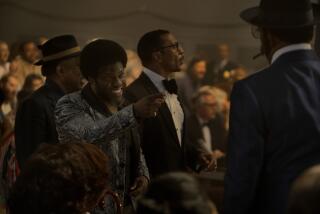Review: ‘Race’s’ incendiary topic defused by Mamet’s underwritten characters
“The law, Mr. Strickland, is not an exercise in metaphysics. But an alley fight.”
This sentiment, articulated by an African American law partner to a wealthy white man accused of raping an African American woman in David Mamet’s “Race,” handily sums up the drama that’s in store for us: a Mametian boxing match, in which words naturally take the place of fists.
Now at the Kirk Douglas Theatre in a cleanly staged production by Scott Zigler, “Race” doesn’t care much about specific current events or historical grievances. It is focused, instead, on territorial struggle, the never-ending battle for domination, the ongoing contest for those on top to stay on top and those on the bottom to stand on the necks of their oppressors.
Plunging into controversial waters, Mamet seeks to get beyond the platforms and pieties of racial politics to calmly expose the more Nietzschean dimensions of what is described in the play as “the most incendiary topic in our history.”
Don’t let the white-collar milieu fool you, though. The book-lined law office of Jeffery P. Eisenmann’s set may suggest a successful small firm, but the characters are every bit as ruthless as the less genteel conmen of “America Buffalo” and “Glengarry Glen Ross,” Mamet’s two indelible additions to the American repertoire.
I wish I could report that they are as theatrically memorable. My problem with “Race” hasn’t changed since I reviewed the starry 2009 Broadway production that Mamet directed himself. Basically, the characters seem more like position points in an argument than fully individualized figures, and the situation isn’t developed into anything more than a moot court, in which nothing is resolved and all sides end up looking bad.
Henry Brown (Dominic Hoffman), the African American law partner, launches the play with an assaultive monologue meant to impress upon Charles Strickland (Jonno Roberts), the rich white guy accused of rape, that white people should remain silent on the subject of race. He’s opposed to accepting Charles as a client, but Jack Lawson (Chris Bauer), his white partner, is intrigued by the challenge of usurping a jury’s predetermined narrative with a better story line, no matter if it’s true.
While Charles is sent away to write down on a piece of paper all of his sins that might come back to haunt him during a trial and Henry and Jack argue about the merits of taking on the case, Susan (DeWanda Wise), a young Ivy League-educated African American associate, may be secretly calling the shots.
Wise doesn’t have the stature that this underwritten part requires. She seems more like a college intern than a young lawyer with a sterling résumé, and in trying to preserve the secrets of her character she adopts a chipped delivery that grows monotonous. Yet Kerry Washington, who played the role with more glamorous style on Broadway, didn’t have much more success in making Susan real. This is another of Mamet’s manipulative female characters whose psychology is a function of plot.
Overall, there’s a tentative quality to “Race” that stems from Mamet’s determination to maintain the ambiguity of the situation he contrives (and contrived it often is). Not only is Charles’ guilt an open question, but the motivations of all the characters are inscrutable to a degree. This approach might be intellectually commendable, but it makes for wan drama.
The dialogue sometimes seems like a parody of TV courtroom drama, with questions repeated with numbing regularity: “How’d you meet her? (Pause) How’d you meet this girl?” — soon followed by yet another “How did you meet the girl?” Of course there’s more profanity than would be permitted on network television, and every now and again there’s a zingy line such as Jack’s memorable retort to Charles’ fear that words of his could be taken out of context: “Well, that is the definition of a quote.”
But such pure Mamet gold is in too short supply in a drama that rarely finds the distinctive timbre of its characters’ voices.
------------
‘Race’
Where: Kirk Douglas Theatre, 9820 Washington Blvd., Culver City
When: 8 p.m. Tuesdays-Fridays, 2 and 8 p.m. Saturdays, 1 and 6:30 p.m. Sundays. Ends Sept. 28.
Price: $25-$55 (prices are subject to change)
Info: (213) 628-2772, https://www.centertheatregroup.org
Running time: 1 hour, 40 minutes, including one intermission.
More to Read
The biggest entertainment stories
Get our big stories about Hollywood, film, television, music, arts, culture and more right in your inbox as soon as they publish.
You may occasionally receive promotional content from the Los Angeles Times.











